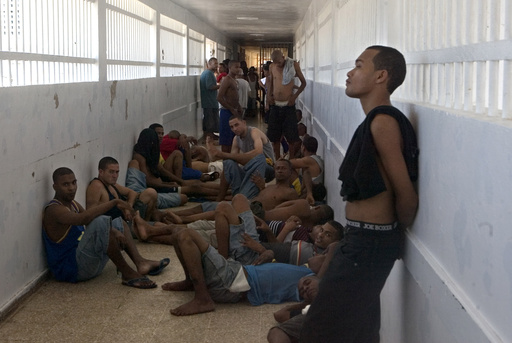
SANTO DOMINGO, Dominican Republic
In the Dominican Republic, inmates referred to as “frog men” endure harsh conditions as they are compelled to sleep on prison floors beside overflowing toilets or makeshift latrines. Overcrowding is a critical issue in the country’s prison system, with some facilities operating at up to seven times their intended capacity. Alarming statistics show that a majority of these inmates remain detained without ever being formally charged with a crime, raising serious concerns about the inhumane living conditions and inadequate medical care they face.
Despite promises from the government to reform the criminal justice system, many critics believe that the Dominican Republic continues to expand pretrial detentions in nearly all criminal cases, even when formal charges have not been made. Activists emphasize the ongoing need for significant changes, as the problems within the prison system continue to escalate. “Prisons have become no man’s land,” remarked Rodolfo Valentín Santos, the head of the National Public Defense Office.
According to the National Public Defense Office, more than 60% of the estimated 26,000 inmates in the nation are held under preventive detention without any formal charges. Proponents argue that this strategy is crucial for public safety, allowing law enforcement time to gather critical evidence. However, some individuals have found themselves trapped in this system, spending up to two decades imprisoned without ever being convicted.
Lugo and Guzmán, two recent visitors to La Victoria National Penitentiary, highlighted the dangerous living environment within the facility, which has been designed to accommodate a maximum of 2,100 but currently houses over 7,000 inmates. Among them, more than 3,300 are under pretrial detention, according to the National Public Defense Office. The prison, infamous for its overcrowding, is the oldest facility of its kind in the country, and its extreme conditions remain a source of concern for many.
“You have to watch out for your life,” Lugo expressed, adding that inmates often experience severe distress due to paltry living conditions. Guzmán added that many inmates are struggling financially, and their situation deteriorates the longer they remain inside. Notably, La Victoria experienced a devastating incident last year when at least 11 inmates died following an electrical short circuit that led to a deadly fire and explosion. This incident was one of the worst prison fires since 2005, which saw over 130 inmates perish.
In response to the dire conditions, President Luis Abinader appointed former prisons leader Roberto Santana to spearhead a commission aimed at reforming the country’s prison system. During his announcement, Abinader acknowledged the existing crisis, committing to use funds recovered from corruption cases to support the construction of new prisons. Santana, who has previously called for the closure of La Victoria and other facilities, is working towards significant changes without political interference. “We don’t take orders from politicians or anyone else,” he said, underscoring the importance of independence in their overhaul efforts.
The Dominican Republic initially began enhancing its prison infrastructure in the early 2000s by building 21 new facilities with properly trained personnel. Unfortunately, reports from the National Commission of Human Rights indicate that conditions have worsened since then. Overcrowded facilities often lack basic hygiene amenities, proper ventilation, and natural light, leading to deteriorating health for many inmates. Currently, nearly 5,000 inmates suffer from various health issues, but many receive only rudimentary medical care, and some facilities are without any medical staff.
The 2023 report from Valentín’s office highlights the urgency of addressing these issues, calling for the closure of the Nagua facility, among others. It emphasizes that the severe overcrowding stifles any chance of rehabilitation and portrays the inmates as being devoid of basic human rights.
The oversight of prison conditions has been linked to corruption, with claims that some prison officials are involved in illegal activities. Despite plans for new facilities, the stagnation of a key project aimed at alleviating overcrowding has further compounded the problem.
While the government plans to construct 25 additional prisons by 2028, concerns remain about the systemic issues within the justice system. Activists have pointed out that judges often fail to release inmates, even when they have been cleared legally, due to backlog issues in the courts and the inability of some to pay mandatory fines.
The situation remains precarious and continues to call for urgent reforms to safeguard the rights and well-being of individuals within the Dominican Republic’s prison system.

